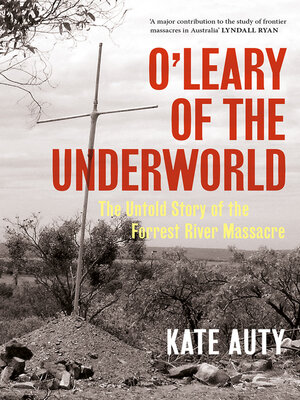
Sign up to save your library
With an OverDrive account, you can save your favorite libraries for at-a-glance information about availability. Find out more about OverDrive accounts.
Find this title in Libby, the library reading app by OverDrive.



Search for a digital library with this title
Title found at these libraries:
| Library Name | Distance |
|---|---|
| Loading... |
In June 1926, a posse of police officers and white civilians murdered at least twenty Aboriginal people near the Forrest River Mission in the Kimberley. After the massacre, a conspiracy of silence descended. Witnesses vanished. Charges against two of the officers were dropped for insufficient evidence.
One of the massacre's perpetrators was Bernard O'Leary, a former soldier whose land holding was known as 'the underworld'. At the 1927 royal commission into the killings, O'Leary was portrayed by his lawyer as a simple honest bushman who had been framed. In this powerful account, Kate Auty argues that O'Leary was in fact 'vicious, brazen and a bullshitter', with 'a propensity for brutality'. Although never charged, he played a leading role in the murders, and his duplicitous testimony thwarted the commission's work.
In electric prose, Auty depicts O'Leary as a merciless killer, while the apparatus that concealed his crimes is portrayed with great realism and clarity. Driven by both forensic and moral judgement, the book exposes the injustices embedded in Australian settlement history, and the culture of denial that has prevented truth-telling in this country.
'A major contribution to the study of frontier massacres in Australia' —Lyndall Ryan
'In her investigation into the life and character of Patrick O'Leary, one of the rogue males who prowled the Australian frontier in the 1920s, Kate Auty has chased down the sort of detail that scaffolds the dark side of the pioneering narrative we are only just learning to hear. ... A forensically researched document of the persistence of frontier violence into the twentieth century.' —Kim Mahood
'Kate Auty's powerful and passionate work is a timely reminder that our colonial past should not be a foreign country: it's our place, and we all need to know the awfulness of what happened here. ... Her meticulous research also reveals how the cynical response of the Western Australia government – a compromised royal commission and a doomed criminal trial of two police officers – was calculated to bury the truth and deny justice to Aboriginal people.' —Patrick Dodson







